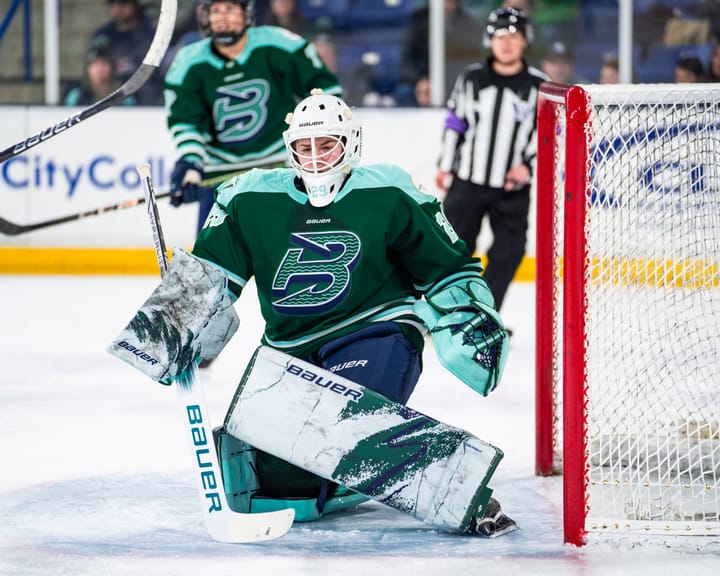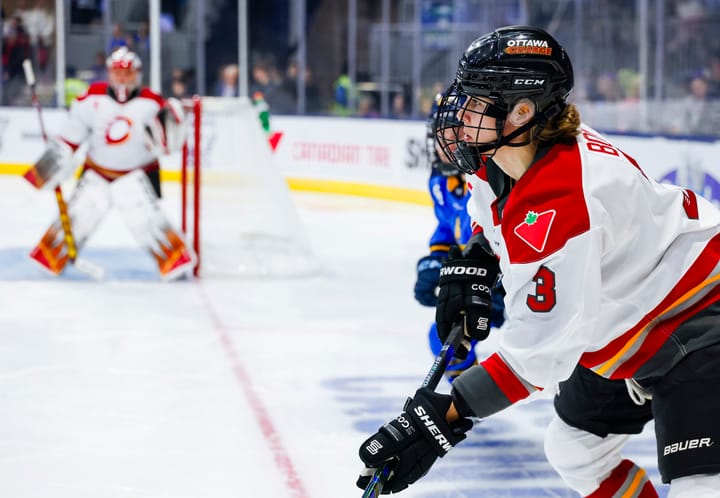Sam Walther wants to raise her game in the NWHL
The Whale rookie knows ‘you don’t get a win unless you play in the game’
It’s an unlikely journey that has brought goaltender Sam Walther from the Annapolis, Md., area to the Connecticut Whale.
This past spring Walther graduated from Hamilton College, a small liberal arts school that has a long hockey history — though its athletic teams are all in Division III. The women’s hockey team was an intramural club sport for many years; it has been a member of the New England Small College Athletic Conference for just over 20 seasons.
A few of Hamilton’s male alumni have played for professional hockey teams in North America and Europe — and one had a 10-year NHL career — but Walther is the first Hamilton alumna to sign with a professional women’s hockey team. She’s determined to prove that the Whale made the right choice.
A fortuitous introduction to the game
Walther’s hockey career so far has been the result of serendipity mixed with determination.
She didn’t really have female hockey role models when she was a child. Walther was a fan of the nearby NHL team — partly because one of the players on that team, Ken Klee, was a neighbor. And she was a playmate of Klee’s son, attempting to block pucks or tennis balls while he practiced taking shots at a net in the street. Eventually the elder Klee told Walther’s parents that Sam showed potential in goal, so they brought her to the same initiation as Klee’s son. “I never took a skating lesson,” she told The Ice Garden. “I just went on the ice and just did it. I’ve been a goalie since I was five.”
Walther took her innate talent, added hard work and focus, and began a hockey career that — she hopes — is only just heating up.
She played on teams (mostly boys’ teams) around the mid-Atlantic before choosing to go away for high school at The Gunnery, a boarding prep school in Connecticut. That hadn’t been her original plan, but when their boys’ hockey coach was scouting one of her teammates, Walther caught the eye of his wife, a Gunnery administrator.
While in high school, she played on the lacrosse and hockey teams. The Gunnery girls’ hockey team won the New England championships during her junior and senior years, and she was named the MVP of the 2014 tournament as a senior.
The first communication Walther received from a college came from the Hamilton College hockey program, when she was a sophomore in high school. She had never heard of the school — or the NESCAC — before that point, but wound up talking to several NESCAC coaches over the next year. When she visited Hamilton, and met with the women’s hockey coach and saw the rink, she decided to attend.
Her very first college playoff game, during her first year at Hamilton, was a memorable and long one.
“We played Middlebury in the NESCAC quarterfinals — and I had a torn MCL, so I was already feeling iffy about the game, and I let the first two shots of the game in. My coach made me stay in ... and 83 shots later, we were in quadruple overtime.
“At the time, Middlebury was the third-best team in the country. We were not ranked — but we ended up tying up the game, and it was 2‒2 for about six periods ... and Emily Fluke scored the game-winning goal [for Middlebury] in quadruple overtime on, like, the 85th shot. So that’s just kind of a funny coincidence that we’re on the same team now. I think it’ll be really cool. I have no hard feelings,” Walther said with a laugh.
Walther was twice selected as a first team All-American during her college hockey career, and she was 2017-18 NESCAC Player of the Year in her senior year. She holds the Hamilton women’s hockey records for career save percentage, shutouts, and goals-against average.
“I think my class changed the culture of [women’s] hockey [at Hamilton]. I really do think that this graduating class, the class of 2018, took Hamilton from just being a hockey club to being a competitive hockey school,” Walther said.
She continued, “I think that’s kind of what I’ve always experienced at the teams I’ve played for. When I was at Gunnery, I knew I wanted to play college hockey, whereas there were a lot of girls ... who didn’t have that drive to get to the next level.” At college, finally having teammates in her class who wanted the same thing — to compete for championships — helped them, and her, reach new levels of success.
Planning for the next step
Even as she played college hockey, Walther was thinking about what to do after graduation. She was in contact with a coach in Europe, but he wanted her to drop out of college to join his team. And by the time Walther did graduate, that opportunity was no longer available.
“I actually was talking to the Europe teams because I really didn’t think anyone in the NWHL was going to look at a D-III goalie — which is, you know, a tough thought to have, because there’s not that recognition,” Walther said wryly, acknowledging that to some degree she had internalized the common opinion of D-III athletics.
But serendipity was on her side, again. “I had kind of given up on [the hope of] playing hockey after college ... I was just ready to be a working adult, but my coaches encouraged me to register as a free agent at the end of the season, and I ended up shooting [Whale] Coach Equale an email just letting him know who I was and that I’d be interested in playing.”
She was invited to the Buffalo Beauts free-agent camp, along with high school teammate and friend Sarah Hughson — who then got an email from Equale that said “I want to sign you” and decided not to attend the camp.
Walther went to Buffalo by herself. “So I’m literally in the parking garage, about to go into the Buffalo Beauts tryout, and Ryan [Equale] gave me a call and said, ‘I know you’re in Buffalo, but I’d love to have you on our team.’”
Old jersey, new colors. Thanks @ChameleonSports for the new set up #FinsUp @CTWhale_NWHL pic.twitter.com/8expkqEbX6
— Sam Walther (@sam_walther40) July 12, 2018
Determination ... and preparation
Being a student‒athlete requires one to be organized as well as determined — and the next phase of Walther’s career will, too. When not guarding the net for the Whale, she’ll be an assistant coach for the women’s ice hockey program at Nichols College in Massachusetts. But she’s ready.
“The academic standard in the NESCACs is so high. I had to teach myself how to be a student when I was at Hamilton and, within that, had to be able to balance being that student [with sports], and it was a really big adjustment. And on top of that I worked two jobs when I was there, plus I wanted to volunteer with the girls’ hockey team, so I really got a lot of experience balancing that schedule, and I think that’s going to help me this year. I think I’m going to enjoy it more — I’ll have something to do all the time, and I need that structure. I’m sure it’ll get tiring at times, but I’m excited for all of it.”
She’s especially excited to help raise the Whale’s level of competitiveness.
“That’s my hope for being a player on the Whale is, you know — they lost in the playoffs, well, how do we win? How do we win in playoffs? And I want to win,” Walther said with determination. “I want to win the championship; I want the Isobel Cup. Having that drive — I know Sarah [Hughson]’s in the same boat — this is a chance to kind of keep doing what we have been, and bring that drive to our team.”
Walther thinks the Whale can deliver. She firmly believes that top women’s hockey talent can come from anywhere, not just from national teams and D-I universities. And she believes that talented players actually are coming from everywhere.
“Other teams are signing a lot of the Olympians, and I think that makes people overlook the Whale, but do you know how many All-Americans the Whale has signed this year? It’s pretty unbelievable. And I think you’ll be surprised at how some of these girls are gonna compete against the national team players, because they are overlooked, just because of that D-III reputation. I am really excited to test myself against these national team players. It will be a challenge for me.”
If Walther is up to that challenge, her next step may be the one that helps the Whale win its first NWHL championship.





Comments ()